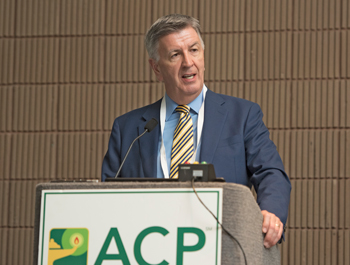Readers weigh in on ACP's meaning, ‘nonspecific’ back pain
Readers respond to coverage about fighting physician burnout and nonspecific back pain.
The meaning of ACP
Reading the President's Message in the May 2018 ACP Internist by Ana María López, MD, MPH, FACP, made me reflect on my own journey as an internist. Like Dr. López's parents, I immigrated to the United States, a few years after graduating from Honduras Medical School, which had a very rigorous eight-year program, with emphasis in development of clinical skills but not much research. Like many other foreign medical grads, we had limited access to top-tier programs in the U.S. for many reasons. To me, ACP has been the equalizer, and I believe it has been the main source of my professional growth.
Attending the annual meeting and other programs, I have had access to some of the best clinicians in the world and many other renowned medical educators. I still remember some of the memorable Opening Ceremonies, like in 2001 in Atlanta, where the keynote speaker addressed women's health issues, and the year the topic was professionalism and a physician from Canada talked about the true meaning of the word. He finished his remarks with the story of Chicken Little and asked each one of us to do our part, even though sometimes it looks like the sky is falling.
MKSAP has been my perennial tool since I first knew about this powerful resource. It was the ninth edition, and since then I have completed all the subsequent editions. Annals of Internal Medicine, with all its multiple opportunities to learn, is a journal that I anxiously wait for every two weeks. I believe that ACP has been instrumental for me to score high in the recertification exam to feel that I can practice medicine at the same level as my peers.
One of the highlights of my career was becoming a Fellow in 1999, because I truly believe in the mission statement of the College. I have tried to do my part by working as remote voluntary faculty of the University of North Carolina, Chapel Hill, for 24 years but, most important, by being an internist in a small town in North Carolina. I am proud of internal medicine, even though the insurance companies try to reduce us to “primary care providers.” I believe that internal medicine is more than that and that ACP is the vehicle that allows us to continue to grow professionally and also as human beings. That is what ACP means to me.
Gerardo Maradiaga, MD, FACP
Chapel Hill, N.C.
Debating ‘nonspecific’ back pain
Regarding “‘New Narrative’ for Back Pain Means Managing Modalities” in the May 2018 ACP Internist, for many years the medical research community has repeated the idea that 85% of low back pain in primary care will be “nonspecific.” This gives patients little opportunity for a specific diagnosis or treatment.
Unless I have missed something, this “85%” is unfounded. It appears to have originated in a single paper published in the Journal of Occupational Medicine in 1969, then uncritically repeated over the years. In 2002, I coauthored a paper in Archives of Internal Medicine documenting the lack of evidence-based research to support the concept of idiopathic low back pain.
Sacroiliac joint dysfunction is a very common but woefully ignored and misunderstood cause of low back pain, acute and chronic. Richard DonTigny, PT, best synthesized this concept with 40 years of research and with his rationale for causation, bedside diagnosis, and painless, simple treatment. His approach has worked very well for my patients and for the many physical therapists I have trained. The uncritical acceptance of a 50-year-old concept needs desperately to be challenged.
Irwin Abraham, MD, FACP
New York City




